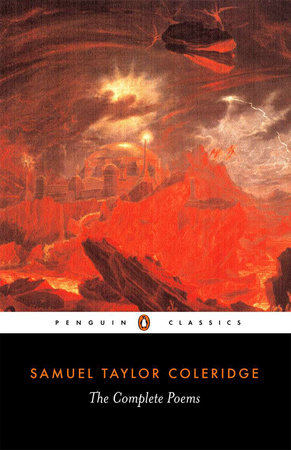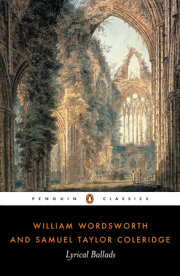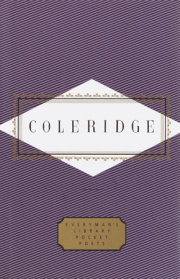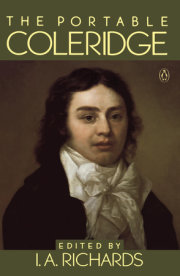The Complete PoemsIntroduction
Acknowledgments
Table of Dates
Further Reading
The PoemsEaster Holidays
Dura navis
Nil pejus est caelibe vita
Sonnet to the Autumnal Moon
Julia
Quae nocent docent
The Nose
Life
To the Muse
Destruction of the Bastille
Anthem for the Children of Christ's Hospital
Progress of Vice
Monody on the Death of Chatteron (first version)
Monody on the Death of Chatteron (second version)
An Invocation
Anna and Harland
To the Evening Star
Pain
On a Lady Weeping
Monody on a Tea-Kettle
Genevieve
On Receiving an Account that his Only Sister's Death Was Inevitable
A Mathematical Problem
Honour
On Imitation
Inside the Coach
Devonshire Roads
Music
Absence: A Farewell Ode on Quitting School for Jesus College, Cambridge
Sonnet on the Same
Happiness
A Wish Written in Jesus Wood, Feb. 10th, 1792
An Ode in the Manner of Anacreon
To Disappointment
A Fragment Found in a Lecture-Room
Ode
A Lover's Complaint to his Mistress
With Fielding's Amelia
Written After a Walk Before Supper
Imitated from Ossian
The Complaint of Ninathoma, from the Same
The Rose
Kisses
Sonnet ("Thou gentle look")
Sonnet to the River Otter
Lines on an Autumnal Evening
To Fortune: On Buying a Ticket in the Irish Lottery
Perspiration: A Travelling Eclogue
Lines written at the King's Arms, Ross, formerly the House of the "Man of Ross"
Imitated from the Welsh
Lines to a Beautiful Spring in a Village
Imitations Ad Lyram
The Sigh
The Kiss
To a Young Lady, with a Poem on the French Revolution
Translation of Wrangham's "Hendecasyllabi ad Bruntonam e Granta Exituram"
To Miss Brunton with the Preceding Translation
Epitaph on an Infant
[Pantisocracy]
On the Prospect of Establishing a Pantisocracy in America
Elegy, Imitated from One of Akenside's Blank-Verse Inscriptions
The Faded Flower
Sonnet ("Pale Roamer through the night!")
Domestic Peace
Sonnet ("Thou bleedest, my poor Heart!")
Sonnet to the Author of the "Robbers"
Melancholy: A Fragment
Songs of the Pixies
To a Young Ass, its Mother being Tethered Near it
Lines on a Friend Who Died of a Frenzy Fever Induced by Calumnious Reports
To a Friend, together with an Unfinished Poem
Sonnets on Eminent Characters:
1. To the Honourable Mr. Erskine
2. Burke
3. Priestly
4. La Fayette
5. Koskiusko
6. Pitt
7. To the Rev. W. L. Bowles (two versions)
8. Mrs. Siddons
9. To William Godwin, Author of "Political Justice"
10. To Robert Southey, of Balliol College, Oxford, Author of the "Retrospect," and Other Poems
11. To Richard Brinsley Sheridan, Esq.
12. To Lord Stanhope, on Reading his Late Protest in the House of Lords
To Earl Stanhope
Lines to a Friend in Answer to a Melancholy Letter
To an Infant
To the Rev. W. J. Hort, while teaching a young lady some song-tunes on his flute
Sonnet ("Sweet Mercy! how my very heart has bled")
To the Nightingale
Lines composed while climbing the left ascent of Brockley Coomb, Somersetshire, May, 1795
Lines in the Manner of Spenser
To the Author of Poems published anonymously at Bristol in September 1795
The Production of a Young Lady, addressed to the author of the poems alluded to in the preceding epistle
Effusion XXXV. Composed August 20th, 1795, at Clevedon, Somersetshire
The Eolian Harp
Lines written at Shurton Bars, near Bridgewater, September, 1795, in answer to a letter from Bristol
Reflections on Having Left a Place of Retirement
On Donne's Poetry
The Hour When We Shall Meet Again
The Destiny of Nations
Religious Musings
From an Unpublished Poem
On Observing a Blossom on the First of February, 1796
Verses addressed to J. Horne Tooke
On a Late Connubial Rupture in High Life
Sonnet written on receiving letters informing me of the birth of a Son, I being at Birmingham
Sonnet composed on a journey homeward; the author having received intelligence of the birth of a son, Sept. 20th, 1796
Sonnet to a friend who asked, how I felt when the nurse first presented my infant to me
Sonnet [to Charles Lloyd]
To a Young Friend, on his Proposing to Domesticate with the Author. Composed in 1796
Addressed to a Young Man of Fortune Who Abandoned Himself to an Indolent and Causeless Melancholy
To a Friend Who Had Declared his Intention of Writing No More Poetry
Ode to the Departing Year
The Raven
To an Unfortunate Woman at the Theatre
To an Unfortunate Woman
To the Rev. George Coleridge
On the Christening of a Friend's Child
Inscription by the Rev. W. L. Bowles in Nether Stowey Church
This Lime-Tree Bower My Prison
The Foster-Mother's Tale
The Dungeon
Sonnets Attempted in the Manner of Contemporary Writers: Sonnet I; Sonnet II; Sonnet III
Parliamentary Oscillators
The Rime of the Ancyent Marinere (1798)
The Rime of the Ancient Mariner (1834)
Christabel
Lines to W. L. while he Sang a Song to Purcell's Music
The Three Graves
The Wanderings of Cain
Fire, Famine, and Slaughter
The Old Man of the Alps
The Apotheosis, or The Snow-Drop
Frost at Midnight
France. An Ode
Lewti, or the Circassian Love-Chaunt
To a Young Lady on her Recovery from a Fever
Fears in Solitude
The Nightingale
The Ballad of the Dark Ladie
Kubla Khan: Or, A Vision in a Dream
[Lines from a notebook - September 1798]
[Hexameters:] William, My Teacher, My Friend!
[Translation of a passage in Ottfried's metrical paraphrase of the Gospel]
[Fragmentary translation of the Song of Deborah]
Catullian Hendecasyllables
The Homeric Hexameter Described and Exemplified
The Ovidian Elegiac Metre Described and Exemplified
On a Cataract
Tell's Birth-Place
The Visit of the Gods
On an Infant which Died before Baptism
Something Childish, but Very Natural
Home-Sick, Written in Germany
The Virgin's Cradle-Hymn
Lines written in the album at Elbingerode, in the Hartz Forest
The British Stripling's War-Song
Names
The Devil's Thoughts
Lines Composed in a Concert-Room
The Exchange
[Paraphase of Psalm 46. Hexameters]
Hymn to the Earth. Hexameters
Mahomet
Ode to Georgiana, Duchess of Devonshire
A Christmas Carol
On an Insignificant
Job's Luck
Love
The Madman and the Lethargist, an Example
On a Volunteer Singer
Talleyrand to Lord Grenville
The Two Round Spaces on the Tomb-Stone
The Mad Monk
A Stranger Minstrel
Inscription for a Seat by the Road Side Half-Way Up a Steep Hill Facing South
Apologia Pro Vita Sua
The Night-Scene: A Dramatic Fragment
On Revisiting the Sea-Shore
Inscription for a Fountain on a Heath
Drinking versus Thinking
An Ode to the Rain
The Wills of the Wisp
Ode to Tranquillity
A Letter to ___, April 4, 1802. - Sunday Evening
Dejection: An Ode
[A Soliloquy of the full Moon, She being in a Mad Passion]
Answer to a Child's Question
A Day Dream
The Day-Dream
To Asra
The Happy Husband
A Thought Suggested by a View of Saddleback in Cumberland
[Untitled]
The Keepsake
The Picture, or the Lover's Resolution
Hymn before Sun-Rise, in the Vale of Chamouni
The Good, Great Man
The Knight's Tomb
To Matilda Betham from a Stranger
Westphalian Song
The Pains of Sleep
[Lines from a notebook - September 1803]
[Lines from a notebook - February-March 1804]
[What is Life?]
[Lines from a notebook - April 1805]
[Lines from a notebook - May-June 1805]
Phantom
[An Angel Visitant]
Reason for Love's Blindness
[Untitled]
Constancy to an Ideal Object
[Lines from a notebook - March 1806]
[Lines from a notebook - June 1806]
Farewell to Love
Time, Real and Imaginary
[Lines from a notebook - 1806]
[Lines from a notebook - October-November 1806]
[Lines from a notebook - 1806]
[Lines from a notebook - November-December 1806]
[Lines from a notebook - February 1807]
[Lines from a notebook - February 1807]
[Lines from a manuscript - 1807-8]
[Lines from a notebook - July 1807; includes lines previously published separately as "Coeli enarrant"]
[Lines from a notebook - January 1808]
To William Wordsworth
Metrical Feet. Lesson for a Boy
Recollections of Love
The Blossoming of the Solitary Date-Tree. A Lament
To Two Sisters
On Taking Leave of ___, 1817
A Child's Evening Prayer
Ad Vilmum Axiologum
Psyche
[Sonnet - translated from Marino]
[Fragment: "Two wedded Hearts"]
A Tombless Epitaph
On a Clock in a Market-Place
Separation
The Visionary Hope
[Lines from a notebook - March 1810]
[Lines from a notebook - April-June 1810]
[Lines from a notebook - May 1810]
Epitaph on an Infant
[Lines from a notebook - 1811]
[Fragment of an ode on Napoleon]
[Lines inscribed on the fly-leaf of Benedetto Menzini's "Poesie" (1782)]
[Lines from a notebook - May-June 1811]
[Lines from a notebook - May-July 1811]
[Lines from a notebook - May 1814?]
[Lines from a notebook - 1815-16]
On Donne's First Poem
Limbo
Moles
Ne plus ultra
The Suicide's Argument
[An Invocation: from "Remorse"]
God's Omnipresence, a Hymn
To a Lady. With Falconer's "Shipwreck"
Human Life, On the Denial of Immortality
[Song from "Zapolya"]
[Hunting Song from "Zapolya"]
[Faith, Hope, and Charity. From the Italian of Guarini]
Fancy in Nubibus
Israel's Lament
A Character
Lines to a Comic Author, on an Abusive Review
To Nature
The Tears of a Grateful People
First Advent of Love
[Reason]
[Lines from a notebook - 1822]
From the German
The Reproof and Reply
Youth and Age
Desire
The Delinquent Travellers
Song, ex improviso
Work Without Hope
The Two Founts
The Pang More Sharp Than All
Sancti Dominici Pallium
The Improvisatore
Love's Burial-Place: A Madrigal
Lines Suggested by the Last Words of Berengarius
Epitaphium testamentarium
Duty Surviving Self-Love
[Homeless]
Song
Profuse Kindness
Written in an Album
To Mary Pridham
Verses Trivocular
Water Ballad
Cologne
On my Joyful Departure from the Same City
[The Netherlands]
The Garden of Bocaccio
Alice du Clos: Or The Forked Tongue. A Ballad
Love, Hope, and Patience in Education
[Lines written in commonplace book of Miss Barbour]
To Miss A. T.
Love and Friendship Opposite
Not at Home
W. H. Eheu!
Phantom or Fact?
Charity in Thought
Humility the Mother of Charity
["Gently I took that which ungently came"]
Cholera Cured Before Hand
Love's Apparition and Evanishment
To the Young Artist, Kayser of Kaserwerth
Know Thyself
My Baptismal Birth-Day
Epitaph
Appendices:
1. On the Wretched Lot of the Slaves in the Isles of Western India
2. [Notebook draft of an essay on punctuation]
Notes
Index of Titles
Index of First Lines








